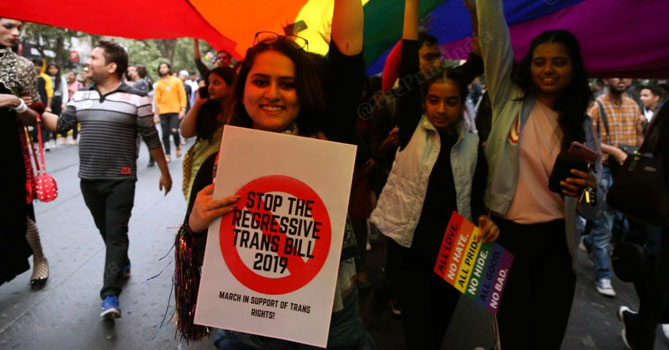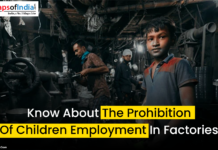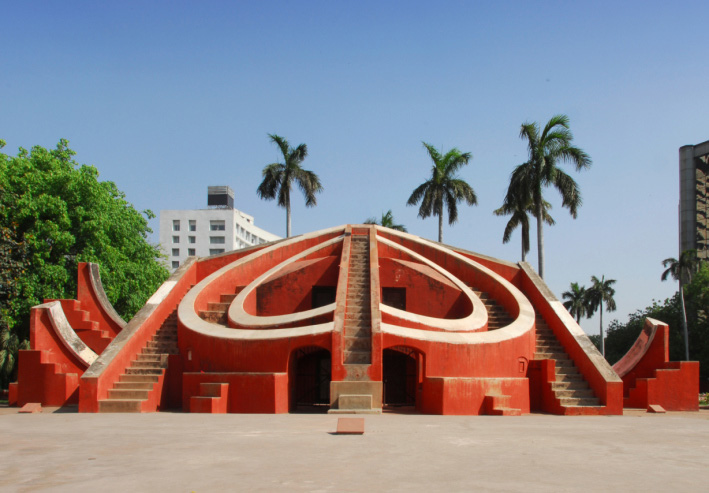
The colour and vibes of Delhi change the minute you step out of Barakhamba metro station on the last Sunday of November every year. You will find the entire street filled with rainbow-colored balloons and flags. Some of the people outside the metro station are busy wearing saree in the shade; some can be seen touching up their red lips while some others are pumped up for the march in pride.
Around 3’O clock in the afternoon, a huge crowd gets gathered on the Barakhamba road which is usually the starting point of the pride walk. You will see a fearless merriment among the people grooving in the beats of dholak, chorusing on songs like “… saat samundar par main tere piche-piche aa gai …” and “ … tere rashke kamar …”.
During the event, organizers of the pride were distributing masquerades, flags, whistles and badges amongst the crowd to gear us up for the walk. A woman was constantly shouting on the microphone asking the wave of people to form a line and to start the walk towards Tolstoy road. Everyone was so engrossed in the rhythm and the “immoral environs” that it took another hour for the walk to start.
Adorned in flamboyant and vibrant gowns and sarees, people of all gender, sexuality, and religion started marching towards the Tolstoy Road, holding placards which read “pyaar hua, ikraar hua, queer hua toh kya hua”, “you know what’s weaker than the economy? Your homophobia”, “Fawad wapas lao, badle mein Ramdev le jao”, “Mandir raj nahin chalega, isbaar hogi pyaar ki jeet” and more of such exuberant quotes.
Love was in the air. Lovers were holding hands and kissing in the open to express their love for each other without the fear of getting policed. Amidst so much love and acceptance, another cute scene was that of the four-legged supporters who walked along with their human parents wearing a rainbow bow tie.
Amidst the peaceful and jovial march, the police who were deployed on the stretch from Barakhamba road, Tolstoy Marg till Jantar Mantar reflected a miniature view of the homophobic nature of our legal system because of their stares and their quizzical looks.
But since this walk is to celebrate the freedom of love, the walking wave of people passed by all the looks and the sneers in much joy and grace. There was also a whopping great rainbow flag stretching from the start, taking people under it and symbolizing the diversity of the community.
This year, the Delhi queer pride took on the Trans bill of 2019 which is extremely regressive. Albeit with 27 amendments, the language in the definition of the transgender was extremely fallacious and incorrect – it defines transgender as “one who neither wholly male nor female”. Not only regressive, but the bill contradicts itself on several levels. One such is – at one hand it says how gender should be fluid and unstructured which shouldn’t be put into the boxes of male-female binary – on the other, it says how a trans person needs to have a certificate issued by a magistrate. Now, imagine yourself to visit a magistrate to get a certificate to establish your existence as a woman or a man – which is no less than dehumanizing.
Another, clause which can be characterized as regressive is “criminalising of begging by transperson”. Trans people in our community are repressed on many levels in our society, one such is economic inequality – as there is no job for them, they are forced to beg to make ends meet. But in the current provision, if they are found begging; they will be sent to jail. Abolishing Section 377 was an important move for the community, but there is still a long way to go.
Delhi’s first pride parade took place on June 30, 2008, with just 500 people addressing Section 377 of the Indian Penal Code, which criminalizes homosexuality (now read down by the Supreme Court of India), shouting slogans like “377, quit India”. The march is growing bigger every year and this year was the 12th edition of the pride walk Delhi 2019 with more than 6,000 Lesbian, Gay, Bi-sexual, Trans, Queer, Intersex, Asexual (LGBTQIA) supporters taking the street to show solidarity against the regressive outlook of society towards the community.





